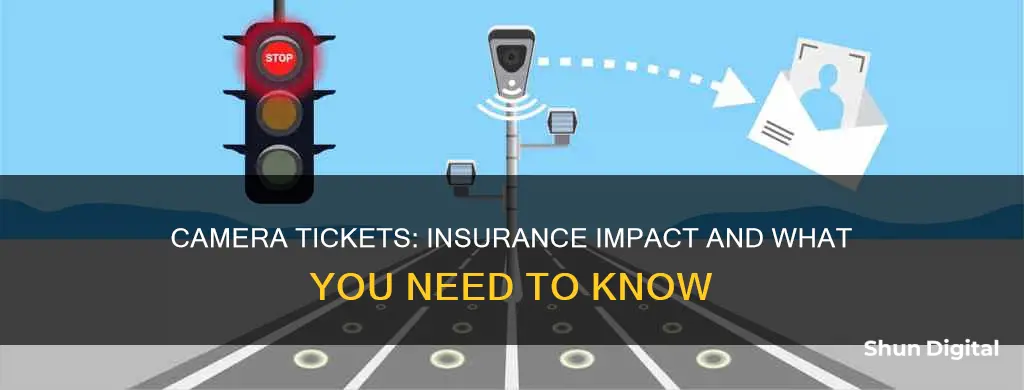
Getting a ticket for speeding or running a red light can be a shock, especially when it arrives in the mail. But do these camera tickets affect your insurance? In most states, the answer is no. Camera speeding tickets are usually treated as non-moving violations, similar to parking tickets, and therefore don't appear on your driving record or impact your insurance rates. However, there are exceptions. In Arizona, California, and Oregon, camera tickets are treated as regular moving violations, which can result in points on your license and higher insurance premiums. So, while camera tickets may not always affect your insurance, it's still important to drive safely and follow the rules to avoid any unnecessary risks and keep your community safe.
| Characteristics | Values |
|---|---|
| Do camera tickets affect insurance rates? | In most states, camera tickets do not affect insurance rates. |
| How do insurance companies treat camera tickets? | Most states treat camera tickets like non-moving violations, similar to parking tickets. |
| Do camera tickets go on your driving record? | Camera tickets can go on your driving record but this is not common. |
| Do camera tickets add points to your license? | In most states, camera tickets do not add points to your license. |
| Which states treat camera tickets as moving violations? | Arizona, California, and Oregon treat camera tickets as moving violations. |
| Which states ban insurers from using camera tickets to raise rates? | New York and North Carolina ban insurers from raising rates based on camera tickets. |
What You'll Learn

Camera tickets are treated as non-moving violations in most states
Camera tickets, such as those issued for speeding or running a red light, are generally treated as non-moving violations in most states across the US. This means that they are viewed in the same way as parking tickets, or tickets issued for issues like broken tail lights or expired registrations. These types of violations are not related to the act of driving and typically do not carry the same consequences as moving violations.
When a camera-based ticket is treated as a non-moving violation, it does not result in points being added to your driver's license or a mark on your driving record. This is an important distinction because these types of violations are not typically reported to insurance companies and therefore do not directly impact your insurance rates. In other words, your insurance company will not see the violation and thus cannot use it as a reason to increase your premiums.
However, it is worth noting that the impact of camera tickets on insurance rates can vary depending on the state and insurer. While most states treat camera tickets as non-moving violations, a few states, such as Arizona, California, and Oregon, treat them as moving violations. In these states, camera tickets can result in points on your license, which may lead to increased insurance rates. Additionally, even in states where camera tickets are not treated as moving violations, insurance companies may still have access to your driving record and be aware of the violation.
It is always a good idea to consult with your insurance provider if you have specific concerns about how a camera ticket may impact your rates. Additionally, it is important to remember that while camera tickets may not directly affect your insurance, they can still result in fines and other penalties, such as a hold on your vehicle registration renewal if left unpaid.
Charging Camera Batteries: A Global Guide
You may want to see also

Camera tickets are like parking tickets
In most states, camera tickets are treated like non-moving violations and so do not affect insurance rates. However, in some states, camera tickets are treated as moving violations, which can result in points on your license and an increase in insurance rates. For example, in Arizona, you will receive two points for a red-light camera violation and three points for a speeding camera violation. In California, a red-light camera violation will result in one point, and in Oregon, it is considered a Class B traffic violation.
It is important to note that even if a camera ticket does not affect your insurance rates, you will still need to pay the fine. Failure to do so may result in additional consequences, such as being unable to renew your vehicle's registration.
Overall, while camera tickets and parking tickets are similar in that they are both non-moving violations, it is important to understand the specific laws and regulations in your state regarding camera tickets and how they may impact your driving record and insurance rates.
The Evolution of Polaroid: 103 Land Camera's Debut
You may want to see also

Camera tickets don't name a driver
Camera tickets, such as those issued for red-light violations, speeding, or school zone speed limit infractions, can result in fines, points on your driving record, and increased insurance rates. While these tickets are typically mailed to the registered owner of the vehicle, it's important to note that the driver is responsible for the violation, not the owner.
If you receive a camera ticket and you were not the person driving, you have several options to consider:
- Fill out a nomination form: You can choose to identify the actual driver by filling out a nomination form. This will result in the ticket being dismissed against you and refiled against the person you identify. However, you are not legally required to do so and have the right to remain silent.
- Pay the ticket yourself: You may decide to pay the ticket yourself, especially if the actual driver is a close friend or family member, to save them the hassle. However, this option is not recommended as it may still affect your insurance rates.
- Fight the ticket yourself: You can reserve a court date for your arraignment and plead not guilty. You will need to post bail, which is typically around $490, and present your case at the trial. You are not obligated to identify the driver, and a judge or prosecutor cannot force you to do so.
- Hire an attorney: Engaging an experienced attorney can be beneficial as they can appear on your behalf, handle the case correctly, and work to get the ticket dismissed without it being refiled against the true driver. They can also assist in reducing the infraction to a non-moving violation, which means no points on your record.
It's worth noting that the specific processes and options may vary depending on your location. For example, in Washington State, you can file a Declaration of Non-Responsibility, asserting that the vehicle was not in your care, custody, or control at the time of the violation. This can be done online, by mail, email, or fax, and typically results in the ticket being cancelled or a hearing being scheduled.
Marco Mode: Panasonic Camera's Secret Superpower
You may want to see also

Camera tickets are usually not added to driving records
However, there are exceptions. In the US, three states—Arizona, California, and Oregon—treat camera tickets as regular moving violations, which can result in points on your license and higher insurance rates. In Canada, a speeding camera ticket in Ontario will not directly impact your insurance, but it is still important to drive safely and follow the rules to avoid any unnecessary risk.
Charging Your Panasonic Lumix DMC-FZ70 Camera Battery: A Guide
You may want to see also

Only three US states treat camera tickets as moving violations
Arizona, California, and Oregon
While most US states treat camera tickets as non-moving violations, on par with parking tickets or tickets for expired registration, only three states consider them moving violations: Arizona, California, and Oregon.
In these three states, camera tickets may result in points on your license, which can lead to increased insurance rates. In Arizona, drivers receive two points for red light camera violations and three points for speeding camera violations. California assigns one point for red light camera infractions. In Oregon, a red light camera ticket is considered a Class B traffic violation, which can increase insurance costs by 5% to 15% depending on the insurer and driving history.
Other States
Fifteen states do not have red light or speeding cameras, and the states that do generally classify the infractions as non-moving violations, which do not impact insurance rates.
Some states, like Connecticut, Delaware, and New York, allow the use of red light cameras and speed cameras in specific jurisdictions or under certain circumstances, such as in school zones or work zones.
Fighting Camera Tickets
It is possible to fight speeding or red light camera tickets. You can request photo or video evidence to ensure it clearly shows your vehicle, license plate, and the infraction. If you had a valid reason for breaking the law, such as an emergency or avoiding an accident, you can explain this to the judge, which may lead to a dismissal of the charges.
Finding Your Camera Charger: Quick Solutions
You may want to see also
Frequently asked questions
Camera tickets do not affect insurance in most states. Speeding tickets captured by cameras are treated as non-moving violations, similar to parking tickets.
Non-moving violations are infractions unrelated to the act of driving, such as parking illegally, having a broken taillight, or an expired registration.
Yes, in Arizona, California, and Oregon, camera tickets are treated as regular moving violations and can result in increased insurance rates.







